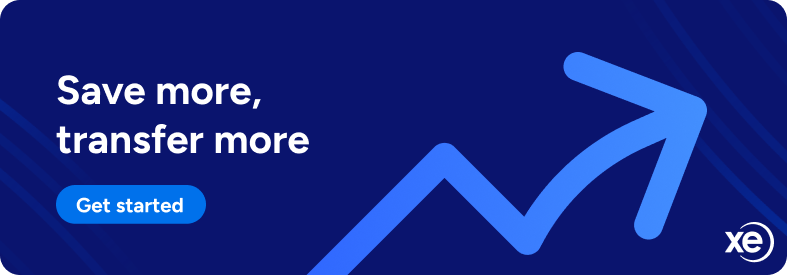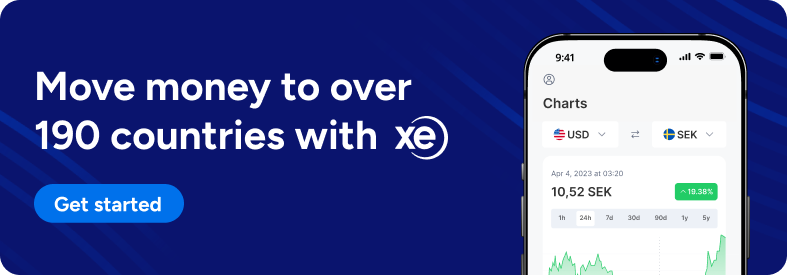- Home
- Blog
- Life Abroad
- Moving to Canada: A Guide for Expats

Moving to Canada: A Guide for Expats
1 juli 2025 — 7 min read
Table of Contents
Key takeaways
Canada offers multiple visa paths for work, study, and permanent residency with a points-based immigration system that rewards skills and education.
Expats flock to cities like Toronto, Vancouver, and Montreal for jobs and lifestyle—but smaller cities may offer better affordability and quality of life.
Xe helps you move money confidently with secure, fast international transfers and live currency tools.
Introduction: Your new life in Canada
Canada continues to rank among the world’s top countries for quality of life, safety, and economic opportunity. From its progressive values and friendly people to its stunning landscapes and stable economy, it’s easy to see why millions of newcomers choose Canada as their new home.
Whether you’re moving for a better job, enrolling in a Canadian university, joining your partner, or simply looking for a fresh start, there’s a lot to consider before you land. This guide will walk you through everything you need to know—from visa options and healthcare access to financial preparation and settling in.
And if you're wondering how to transfer money safely during the process, we’ve got that covered too.
Visa types and entry requirements
Immigrating to Canada starts with choosing the right path. The country’s immigration system is widely praised for being merit-based, which means your education, work experience, language skills, and age can all boost your chances of acceptance.
Here are some of the main options:
Visa Type | Purpose | Valid for | Notes |
|---|---|---|---|
Express Entry | Skilled workers | Permanent residency | Based on a Comprehensive Ranking System (CRS) |
Student Visa | Higher education | Length of study | Must show school acceptance and funds |
Work Permit | Temporary employment | Up to 3 years (renewable) | Employer sponsorship often required |
Provincial Nominee | Regional employment programs | Permanent residency | Tied to a specific province |
Family Sponsorship | Join family in Canada | Permanent residency | For spouses, partners, and close relatives |
Immigration processing times can range from a few months to over a year, depending on your program and application completeness. It's important to ensure your paperwork is accurate and up to date.
Pro tip: Some programs—like Express Entry—operate on a points system. You can improve your score by taking an approved English or French language test, or by getting your educational credentials assessed in advance.
Where to live in Canada: A closer look
Canada offers a variety of living experiences depending on your priorities. Whether you're looking for vibrant urban life, outdoor adventure, or a quieter, affordable setting, you’ll find it here.
Here’s a breakdown of top Canadian cities for expats:
City | Avg. rent (1-bed) | Highlights | Best for |
|---|---|---|---|
Toronto, ON | CAD 2,300 | Finance, arts, multicultural | Professionals, students |
Vancouver, BC | CAD 2,400 | Ocean, tech sector, mild winters | Nature lovers, tech workers |
Calgary, AB | CAD 1,500 | Low taxes, mountain proximity | Families, outdoor enthusiasts |
Montreal, QC | CAD 1,300 | French culture, education hub | Students, creatives |
Halifax, NS | CAD 1,200 | Coastal charm, growing tech | Retirees, remote workers |
Ottawa, ON | CAD 1,800 | Government jobs, bilingual city | Civil servants, bilingual families |
Larger cities tend to have more job opportunities and cultural amenities but come at a higher cost. Smaller and mid-sized cities like Halifax and Ottawa are increasingly popular with expats who value community feel and a lower cost of living.
Did you know? Over 23% of Canada’s population is foreign-born⁶, making it one of the most welcoming countries in the world for immigrants.
Opening a Canadian bank account
You’ll need a local bank account to manage your everyday finances—like getting paid, paying rent, or setting up utilities.
To open an account, you’ll usually need:
A valid passport
Immigration papers (study permit, work permit, or PR)
Canadian address (temporary housing is acceptable)
Social Insurance Number (SIN)
Some banks offer newcomer banking packages with no monthly fees for the first year, multilingual support, and quick debit card access. Credit unions and online banks may offer more flexible terms if you’re missing documentation.
If you haven’t arrived yet or need to transfer funds between countries, Xe offers fast, secure transfers with real-time exchange rates and no hidden fees—ideal for initial housing deposits or tuition payments.
Canada’s healthcare system
Canada’s healthcare system is one of the country’s biggest draws, offering universal access to essential medical services. However, it’s not automatic the moment you arrive.
What to know:
Public healthcare is administered by province, so your eligibility and wait time will depend on where you settle.
Most provinces require a 3-month residency before you're eligible.
During that gap, private health insurance is highly recommended.
International students usually get student health plans bundled with tuition.
Once you're covered, doctor visits and hospital care are generally free at the point of service. Dental and vision are typically not included, but employer or school benefits may cover them.
Understanding Canadian taxes
If you live and earn in Canada, you’ll need to file taxes. Canada's system is progressive, which means your rate increases with income.
Key tax facts:
Tax year: January 1 – December 31
You’ll need to file a return every spring (usually due by April 30)
New residents may qualify for certain tax credits
You’ll receive a T4 from your employer, or use tax slips from your university if you're a student
Some expats may also owe taxes in their home country depending on tax treaties. Canada has agreements with many countries to avoid double taxation, but it’s wise to consult a tax professional.
Managing money internationally
Whether you’re sending money back home, paying tuition abroad, or funding your move, international transfers will likely become part of your life.
Provider | Speed | Fees | Exchange Rates | Best For |
Traditional Banks | 2–5 business days | Often high | Usually marked up | Infrequent, high-value transfers |
Xe | Same day–2 days | Low to none | Real-time, competitive | Reliable, regular cross-border payments |
With Xe, you can make transfers in just a few clicks—and track them every step of the way. Whether it’s your first rental deposit in Canada or ongoing support to loved ones back home, you can trust Xe to get your money where it needs to go, quickly and securely.
FAQs: Moving to Canada
1. Can I immigrate to Canada without a job offer?
Yes. Many Express Entry applicants are selected based on skills alone. A job offer helps but isn’t always required.
2. Will I qualify for public healthcare right away?
In most provinces, there’s a 3-month wait. Private insurance is recommended during that time.
3. Should I rent or buy a home?
Renting is more common for newcomers. Buying requires credit history and a large down payment.
4. Is it hard to open a bank account without a job?
Not necessarily—especially if you’re a student or show proof of funds. Newcomer accounts are designed for just this situation.
How Xe supports expats moving to Canada
Relocating internationally is exciting—but managing finances across borders can be a challenge. Xe makes it easier.
With Xe, you can:
Send money to 190+ countries in 130+ currencies
Lock in competitive rates with no hidden fees
Track transfers in real-time
Set up Rate Alerts or use the Xe Currency Converter
Use our Bank Comparison Tool to find the best transfer option
Estimate mortgage costs using our Canada Mortgage Calculator
With over three decades of experience, Xe is the trusted platform for international money movement—before, during, and after your move.
The information in this blog is for general informational purposes only and does not constitute legal, tax, financial, or immigration advice. Policies related to immigration, healthcare, banking, and taxation can vary by province and are subject to change. Xe makes no guarantees regarding the accuracy, completeness, or timeliness of the information provided. Readers should consult qualified professionals for guidance specific to their situation. Examples, rates, and references are illustrative only and may vary based on eligibility and provider terms. Xe is not affiliated with any government body and does not offer immigration or legal services.
Smarter money transfers
Xe combines bank-beating rates, secure transfers, and global reach to make moving money across borders fast, easy, and affordable.

2 september 2025 — 7 min read

16 juli 2025 — 6 min read

1 juli 2025 — 7 min read

1 juli 2025 — 5 min read

1 juli 2025 — 6 min read

1 juli 2025 — 5 min read

